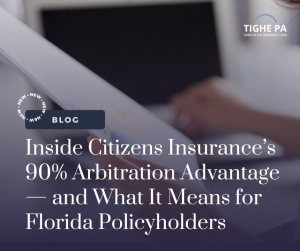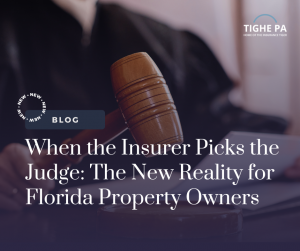On the surface, Wellington, Florida, looks like it’s moved on. Trees have been trimmed, tarps are fewer, and the streets no longer echo with sirens. But for many families affected by the EF3 tornado that tore through the region in October 2024, the real hardship began after the winds died down.
Six months later, dozens of homeowners are still entangled in delays, denials, and bureaucratic back-and-forths with their insurance companies. As another hurricane season begins, this long recovery underscores an uncomfortable truth: Florida’s disaster claims system is failing the people it was designed to protect.
The Tornado Ended. The Waiting Didn’t.
The tornado touched down on October 9, 2024, with wind speeds reaching 140 miles per hour. It was part of the broader storm system tied to Hurricane Milton and became one of the most severe tornadoes ever recorded in Palm Beach County. Wellington suffered some of the worst damage.
Many residents described how, in under a minute, their lives were upended. Some recounted feeling like the pressure from the wind was crushing their homes from the inside. Windows shattered, roofs peeled away, and entire vehicles were hurled down the street. Several homes were displaced from their foundations entirely.
The claims we are working on in the area have estimated damages exceeding $500,000.00 per home in the hardest-hit blocks. But even now, many policyholders have received only partial payouts—or none at all.
Delayed Claims, Displaced Lives
Local officials report that 229 housing units in Wellington alone were damaged by the tornado, with at least 20 sustaining major structural loss. Despite emergency declarations and swift assessments by local authorities, at least 26 families remain displaced due to unresolved insurance claims.
Without full settlements, homeowners are unable to apply for permits or fund the basic repairs needed to return home. In the meantime, they are shouldering dual financial burdens—temporary housing expenses and mortgage payments on damaged properties.
Some families say the stress has become a constant presence, affecting work performance, relationships, and children’s mental health. Parents have reported that their young kids grow anxious every time it rains, fearing that another storm might be on the horizon.
Why Repairs Are Still on Hold
While adjusters face logistical challenges after widespread disasters, many policyholder advocates argue that the delays are often deliberate. Insurance carriers, they say, benefit from extending the claims process until homeowners are pressured into accepting undervalued settlements.
“Insurance is just paperwork—until your claim is denied,” says Dan Tighe, Esq., founder of Tighe P.A. and a licensed insurance professional. “That’s when you realize who’s really in your corner.”
Tighe P.A. has represented policyholders across Florida in major storm disputes, using the “Tiger System”—a strategy-focused, data-driven approach to investigating, presenting, and negotiating claims to maximize recovery.
Without completed claims, homeowners cannot get permits. Contractors won’t begin work without proof of funds. Meanwhile, rising material and labor costs continue to inflate the total burden. Some families have been forced to take on additional debt or defer repairs altogether.
Fixing What’s Broken—Before the Next Disaster Strikes
Florida’s insurance market was already under strain before this tornado. A series of recent hurricanes, rising premiums, and major insurers exiting the market have all contributed to an unstable system. But the aftermath of the Wellington tornado has made it painfully clear that the system isn’t just strained—it’s broken.
According to the Florida Office of Insurance Regulation, more than 239,000 property damage claims from Hurricane Milton remain open or unresolved. While the tornado is technically a separate event, the overlap in time, geography, and claims processing has created a compounding effect that leaves communities vulnerable.
A FEMA spokesperson recently acknowledged the widening gap between storm events and recovery, stating that recovery timelines are becoming “unacceptably long.” The agency emphasized that the goal is to restore stability to families as quickly as possible—not create more uncertainty.
Looking Ahead: Another Season, Same System
Six months have passed, but for many in Palm Beach County, the disaster hasn’t ended. They’re still waiting on checks to clear, permits to be approved, and homes to be livable again. They’re still dealing with the emotional strain and financial limbo of insurance delays that continue to define their daily lives.
The 2025 hurricane season has already begun. Without significant reform, the same cycle will repeat: a storm strikes, damage follows, and insurance relief stalls—leaving Floridians to face another crisis alone.
For families still waiting, the message is clear: surviving the storm was only the beginning. The real battle is getting the help they were promised.
Need help with your claim?
At Tighe P.A., we fight for policyholders—because disaster recovery should never be this hard. If you’re still waiting for your insurance company to do the right thing, we’re here to help.
Relevant Resources and Citations
- Florida Office of Insurance Regulation – Hurricane Milton Claims Data
- National Weather Service – EF3 Tornado Summary, October 9, 2024
- FEMA – Disaster Recovery Guidance
- WPTV Coverage: Palm Beach County Tornado Victims Still Waiting on Relief
You May Also Like:
- After the Storm: How Mariner Sands and Stuart Homeowners Are Fighting for Fair Insurance Payouts
- Understanding Deductibles in Florida Property Insurance Claims: What Homeowners Need to Know
- How Can I Afford to Replace My Damaged Roof (or Other Damaged Property)?
- What’s My Tile Roof Insurance Claim Worth?


